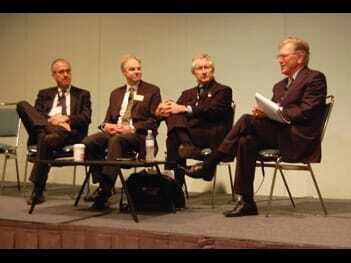European debt crisis: A “clear and present danger” to the entire global economy—but attractive opportunities may emerge post-crisis
In a sobering discussion of the unfolding financial crisis in Europe, panelists compared the level of danger for the global economy to that of the 2008 US financial crisis. But the outlook is somewhat brighter in light of Germany’s likely action to preserve the Euro, and to assist begrudgingly with bailout packages. Some opportunities still exist for real estate investors, and an end to the crisis is likely to bring significant real estate buying opportunities.
Moderator Robert H. Zerbst, an advisor to CB Richard Ellis, noted that the seventeen Eurozone countries vary greatly in economic strength – yet because they share the Euro currency, they have been able to borrow as though they were a single, economically stronger country. Greece and other smaller countries did borrow heavily from private banks to fuel wage increases, benefits and standards of living that were out of line with their increases in productivity, a fundamentally unsustainable condition that came to a head in 2008. The last three years have brought a series of rescue packages from lenders of last resort (such as the IMF) coupled with strict austerity measures. In turn that has resulted in domestic political turmoil for the countries involved, and further economic instability.
Panelist Jeremy Newsum, Executive Trustee of the London-based Grosvenor Estate and former ULI Chairman, argued that the political issues are long-term, but the crisis is short-term, and there isn’t a single solution. “My own view is that the Euro is impossible to sustain,” he says, and either there will be a move to assert full sovereign control over a country or “you have to break the Euro into two parts – a weak and a strong, two different currencies.”
Panelist Jon H. Zehner, Senior Director of AREA Property Partners, believes that the Euro will be preserved in the end. “Don’t always believe what you read in the papers,” he cautioned, noting that his German associates seem deeply committed to preserving the Euro, both as a political and a moral mandate.
Roger G. Orf, Head of Real Estate Europe for Apollo Global Management, countered with his father’s wry comment that Europe is a “theater of war,” and that’s certainly true at present. Germany seems committed to work out the crisis at present, but other nations have different political agendas, he says. Germans already absorbed roughly a trillion dollars in the reunification with East Germany, and they may not be willing to pay another trillion or more to support the Eurozone.
Panelists agreed that the impact of the crisis is certainly global, and will have an important impact on the global investment climate. “This is a clear and present danger for the entire world economy – on par with crisis of 2008,” said Jon Zehner. It’s made more unstable by the increasingly volatile mix of politics with economics, leading to bizarre and unpredictable results.
The panel concluded that the current period of uncertainty will likely be settled one way or another in the next few months. If some countries do leave the Eurozone, it will play havoc with real estate investments in those countries, since many tenants will not be able to pay landlords from devalued currencies. This danger is already being priced in to the market, further depressing economic activity in those countries.
The results, the panel agreed, are that big cities in strong countries (such as London and Paris) remain attractive investments, while most other areas languish. After the crisis, some markets may well offer remarkable buying opportunities.



